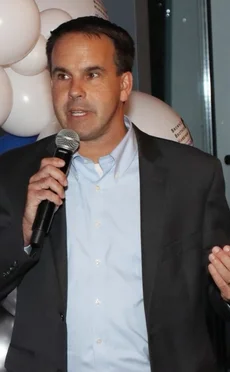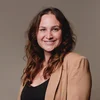Old dogs and new tricks at Brown Brothers Harriman: Meet Kevin Welch
After two decades of working for the oldest private bank in the US, Welch has mastered keeping his balance—change and stasis, humans and artificial intelligence, work and play.

Should you find yourself in Krakow, you wouldn’t go searching for Orange Office Park. You might find it anyway, though, if you drive five minutes from the city’s Old Town, or take a stroll across the river bridge to Kazimierz historic district. And if you did stumble upon it, you might not think much of anything about the office complex, a modern construction comprising four adjoining buildings, which are all, of course, mostly orange.
As one of the first companies to set up shop in the office park, US bank Brown Brothers Harriman occupies most of the space, evidenced by the neon sign that stands roadside, atop the building’s roof.
If you were to draw a line from all the people who today bustle in and out of the park, which serves as the hub for the bank’s technology, client services, and operations functions, the line would cross time and an ocean before ending in Boston, 12 years ago, where Kevin Welch boarded a plane with his wife and two young children.

Armed only with a skeleton crew including the office head, Michael McDonald—fresh off of spending four years building out BBH’s Irish franchise in Dublin—Welch was to help make the Krakow location from scratch, spin up a technical lab, and decide on all new personnel hires, with the overarching goal of better meeting European clients’ demands of the oldest private bank in the US.
Welch remembers vividly the conversation where he was asked to move to Poland—4,000 miles away, a place no one in his family had ever lived—and perform the magic that is making something appear out of thin air.
“There was a recognition that this is going to take me out of my comfort zone,” he recalls.
Today, Welch is back in Boston, and he leads the chief administrative and transformation office within the bank’s service delivery department. At the same time, he’s responsible for workforce transformation disciplines within BBH Investor Services, which provides asset servicing, global markets services, and operating model solutions to asset managers and financial institutions.
He’s been with Brown Brothers Harriman since 2004, and the 20 years that have gone by have been marked the most by change, which is perhaps only right for a man who oversees something called “workforce transformations” at a place that opened its doors more than 200 years ago.
Looking back through WatersTechnology’s archives, you will see that the first story to appear with a Brown Brothers Harriman metatag was published in 2012. But if you dig further, back to when the internet existed only as part of a single room in your house, if at all, you’ll see that we first started following the bank’s technology moves in 1997.
Leafing through the decades’ worth of stories tells a story, or maybe a few, on its own. One of them is that various technology advents and trends were followed and used by the bank as they arose, but few had the staying power of artificial intelligence, machine learning, and adjacent technologies, which have dominated our coverage of the bank since about 2017.
Following the unveiling of BBH’s fintech business that year, what we now know to be called Investor Services, my former colleague James Rundle then wrote in an aptly titled column called The Wind of Change: “I don’t even know what a bank is anymore. Is it technology, is it a vendor? Will the day come where we walk in to get a mortgage and walk out with a five percent stake in a disruptive payments company?” he asked.
It feels prescient now.
Outside the box
Back in Poland, Welch was reckoning with his communication style, finding that he needed to be more direct with his business contacts and prospective employees. More than that, he was tasked with building a workforce that would be competent in emerging technologies, something that, by its very nature, doesn’t have a very wide pool of talent. This, he could at least relate to.
Welch, who has spoken to WatersTechnology about the artificial intelligence projects he oversees numerous times, is not a technologist. And when he joined the bank, he wasn’t a finance expert. Having obtained a bachelor’s degree in history and political science from the University of Massachusetts Amherst, finance and technology became happy accidents for him, spurred by capacities for critical thinking, enthusiasm, and challenging assumptions, which he developed through other disciplines.
It’s this belief—in underlying skills and in honing them—that fueled his perspective on recruiting new hires and still drives his philosophy as a manager and mentor. He was often second-guessed in his choices.
“Why are you hiring someone with a legal background for this type of job?” was a typical kind of refrain.

“Well, think about the skills that they need. Yeah, we’re going to have to teach them some parts of the business, but they’ve got the underlying foundation that we need to be successful,” he’d say. “I want people that exhibit enthusiasm, that are optimistic—I think that can be contagious to a team, and when you’re thinking about change and innovation, it’s really important.”
In 2013, Tim Cote joined Welch in Krakow, following a journey that had seen Cote leave Boston for Luxembourg in 2011, following the bank’s decision to expand its European operations. Cote, who today works as head of business transformation in BBH Investor Services under Welch, had already worked with Welch closely in Boston, and his colleague’s involvement with the new Krakow location drew Cote to the project.
Talent cultivation is a talent shared by the pair, and they were given the duty of securing a management team and setting the tone for the future of the office. This was well before Orange Office Park was a part of the Brown Brothers Harriman footprint.
With no ink on a lease, Welch and Cote met in hotel conference rooms of the Sheraton and the like. Fueled by caffeine and a sense of mission, a particularly intense recruiting trip saw them conduct 10 hours of interviews of roughly 100 candidates, every day for nearly two weeks.
“The person who we were interviewing at 6:00 p.m. got the same level of engagement as the person we were interviewing at nine in the morning,” Cote recalls. “And that’s something that I always really appreciated in Kevin and his real focus on people there.”
Cote—who’s also not a technologist by trade—had earned his degree in economics. And it was the nearly four years he spent in Poland alongside Welch that made him, too, appreciate what different, or even counterintuitive, backgrounds can bring to the table. As technical acumen lost its luster as a differentiator—these were college graduates who had grown up with Facebook, with smartphones, with the skills to design their middle school MySpace layouts in HTML—Cote felt challenged to think in new ways.
What should we do with this? How could we handle that? And it became part of our cadence of how we work together
Diane Teed, BBH
At the end of Cote’s tenure in Krakow, it was time for him to make his way back to the US, and his experience in thinking outside the box carried him to a brand-new discipline, leading BBH’s global human resources operations. The role required building a center of excellence and crafting a five-year strategy around technology.
He had spent years thinking about how technology could improve pragmatic specificities: custody, fund administration, service delivery, straight-through processing. He hadn’t considered how technology would change things more broadly. For example, would it change the entire way we work? It would.
One year before the Covid-19 pandemic would force workforces around the world out of their offices and into their living rooms, Cote left his HR role and joined the newly created business transformation initiative—led by none other than Welch.
The more things change…
The first time I met Welch was over the phone in the summer of 2019. The conversation yielded this story about the bank’s use of machine learning for detecting price anomalies and striking net asset values. Like so many hired by Kevin, I had no experience in finance or technology—only a lowly journalism degree that had just turned one year old—and I had reached out, mildly frantic, because after four months as a professional journalist, I had yet to coax a banker into an on-the-record conversation.
This sense of panic was aided and abetted by the fact that I had no idea what was going on, in general, and did not know how to have a conversation about artificial intelligence with someone who actually knew what artificial intelligence was. Neither of these facts bothered Welch, and once I hung up the phone, I felt, maybe for the first time since joining WatersTechnology, that I might be able to hack it.
Since then, Welch has sat down with us many times, offering various updates on the bank’s tech projects.
At the start of 2020, he hoped that by 2021, the goal was to have transformed the fund accounting process end-to-end using AI. His team had developed an algo validation tool meant to help clients validate their own proofs-of-concept, and their anomaly-detecting NAV tool had already eliminated 90% of false positives. They had also developed a system called Guardrail, which measured the overall portfolio of a fund against a user’s chosen benchmark or index and monitored for dramatic price movements.
Months later, Covid brought its own March madness, and caused the business to readjust its plans. The bank had the NAV system to thank for helping sort out massive price movements, as the markets slipped nearly 8% at the start of lockdown, but it was also overwhelmed. The havoc led Welch to begin implementing multi-model environments where, on a day of heightened volatility, the business can watch and adjust the models’ performances side-by-side in real time.
It also forced the bank to retrain its algorithm for Linc, its reconciliations application, by feeding through thousands of new scenarios and pre-programming how the system should react in each of them.
Adaptability may well be a survival skill for an institution that celebrated its 206th birthday this year. (By contrast, the United States turned 248.) But identity is easily lost in constant change. You need some things to have staying power.
Diane Teed joined BBH in 2005, the year after Welch. Unlike him, she cut her teeth on finance her whole career, having begun at Citicorp in New York in the late 80s and working her way up to Boston, where she joined State Street in 1996.
Around 2003, she reached an inflection point and considered several different paths to take her career and her life, leaving the industry for two years. When someone put her in touch with BBH, she says she was “fascinated” from the first interview.
“One of the things that attracted me at the time still holds true today,” Teed says. “Every partner I met with was really different and had different angles and perspectives on things. And I knew right then and there that if an organization could tolerate so many different perspectives like that in the leadership, there was something special about the culture.”
Now chief administrative officer for service delivery, she also spent some time in HR roles and previously held the job Welch now performs there. Teed was also involved in the two-years-long negotiations that would have seen State Street acquire BBH’s Investor Services business. The deal fell apart in 2022. Since then, she’s assumed a focus on strategy and innovation.
You can’t pick up a newspaper now without one saying AI is going to take all these jobs. My personal opinion is the firms that are going to be successful are the ones who think about humans plus AI
Kevin Welch, BBH
Welch and Teed first began closely working together while he was in Krakow, when 40% of her team was based there. When he returned, they sat back-to-back in the office, where they realized they possessed complementary strengths. Where Welch would bring novel ideas and passion, Teed would offer pragmatism, analysis, and a game plan for communicating those ideas throughout the organization.
“At the end of every day, I knew it was coming. I could almost feel the wind as he was coming by, and he would stop at my desk for our end-of-day brain dump,” Teed recalls. “What should we do with this? How could we handle that? And it became part of our cadence of how we work together.”
She remembers the bank’s first forays into robotic process automation, once a new frontier before AI stole the show. Welch had started implementing RPA processes while in Krakow, but it didn’t take long for them to realize their chosen use-cases weren’t suited for RPA. It was a lesson in failing fast—something that financial services firms, she says, aren’t very equipped to do.
Earlier this year, Teed moved to a different floor of the Boston office, which means the duo now must take the stairs to consult with their sidekick.
“It’s a way to burn off energy, running up and down the stairs,” she laughs.
…the more they stay the same
Two years ago, terms like “ChatGPT,” “generative AI,” and “large language model” became household names almost overnight. Now, ChatGPT is on its fourth iteration, and it’s been praised by paper pushers, demonized by creatives, and beloved by academic essay-dodgers.
This year alone has seen brat summer, a sitting US president’s bowing out of the race, a Black woman rising in his place, and not one but two assassination attempts on the last guy who was president and who hopes to be again.
Things change fast, and even old dogs must learn new tricks.
It’s not only the work that’s changed significantly, but the nature of the work, Welch says. There’s less process-centric knowledge required to be successful—less brawn than what was required of him when he entered the fray. But that’s not a death sentence to those who are well-versed in the esoteric arts.
“You can’t pick up a newspaper now without one saying AI is going to take all these jobs,” Welch says. “My personal opinion is the firms that are going to be successful are the ones who think about humans plus AI. How do I decide what I’m really good at, and what are the skills and activities that I, as a human, possess, that machines really can’t replicate? And then how do I augment that with what AI does really well? Which, in a lot of cases, is data-heavy tasks.”

Today, Welch finds himself in a moment of personal transition. Those two little kids he moved to Poland and back with have grown up. His son has started his sophomore year of college, and his daughter is a senior in high school. As his work life gets more digitized during those long hours—he is still a banker, after all—it’s important to him that he spends as much time as he can outdoors, where he can put his brawn to use through hiking and kayaking.
And, as his UMass degree illustrates, he still loves history—to the chagrin of his children, whom he forces to endure historical tours during family vacations. If you looked at his podcast list or his reading list, you would find a listing about history for each one you’d find about AI.
Welch, as his colleagues will tell you, invests his time. He’s invested in his job, in his family, in his interests and hobbies, but mostly, he’s invested in other people whom he finds, well, interesting.
This is a trait that struck Tim Cote, and that stuck with him. As they were building out the Krakow office—before there even was much of an office—a small group of ex-pats had been assembled. Though united by a shared sense of adventure, they also shared some sadness during US holidays, which their families celebrated without them back home.
For three years, Welch and his family hosted a US Thanksgiving dinner party at their home, attracting up to 50 guests including American ex-pats and Polish colleagues and their families. The first year of the feast, the Welches encountered a problem: they could not find a turkey.
They scoured the city and nearly came up short. They sourced parts of a turkey from a local Mexican restaurant, but they didn’t have a traditional whole bird to sell them. As Welch puts it, the feast turned into a “DIY turkey assembly project,” but it certainly provided some laughs around the table.
The Welches’ dinners account for some of Cote’s most beloved memories from his time in Krakow.
“Thanksgiving in Polish—that’s Święto Dziękczynienia,” Cote says. It’s one of my favorite words I’ve learned.”
Further reading
Only users who have a paid subscription or are part of a corporate subscription are able to print or copy content.
To access these options, along with all other subscription benefits, please contact info@waterstechnology.com or view our subscription options here: https://subscriptions.waterstechnology.com/subscribe
You are currently unable to print this content. Please contact info@waterstechnology.com to find out more.
You are currently unable to copy this content. Please contact info@waterstechnology.com to find out more.
Copyright Infopro Digital Limited. All rights reserved.
As outlined in our terms and conditions, https://www.infopro-digital.com/terms-and-conditions/subscriptions/ (point 2.4), printing is limited to a single copy.
If you would like to purchase additional rights please email info@waterstechnology.com
Copyright Infopro Digital Limited. All rights reserved.
You may share this content using our article tools. As outlined in our terms and conditions, https://www.infopro-digital.com/terms-and-conditions/subscriptions/ (clause 2.4), an Authorised User may only make one copy of the materials for their own personal use. You must also comply with the restrictions in clause 2.5.
If you would like to purchase additional rights please email info@waterstechnology.com
More on Emerging Technologies
DTCC tests 24x5 trading, State Street launches digital asset platform, and more
The Waters Cooler: STG carves out S&P Global’s data businesses, Arcesium expands in Hong Kong, and Rimes partners with three vendors in this week’s news roundup.
Banks split over AI risk management
Model teams hold the reins, but some argue AI is an enterprise risk.
Waters Wavelength Ep. 344: Hot topics for 2026
Tony and Shen preview some of the topics they think will be big this year.
Fintechs grapple with how to enter Middle East markets
Intense relationship building, lack of data standards, and murky but improving market structure all await tech firms hoping to capitalize on the region’s growth.
SimCorp–MSCI expand partnership, quantum exploration, Dora concerns, and more
The Waters Cooler: Droit launches GenAI regtech tool, bids for EU OTC derivatives tape open, and more in this week’s news roundup.
The quantum leap: How investment firms are innovating with quantum tech
While banks and asset managers are already experimenting with quantum computing to optimize operations, they should also be proactive in adopting quantum-safe strategies.
‘The end of the beginning’: Brown Brothers Harriman re-invents itself
Voice of the CDO: Firms who want to use AI successfully better start with their metadata, says BBH’s Mike McGovern and Kevin Welch.
2026 will be the year agent armies awaken
Waters Wrap: Several AI experts have recently said that the next 12 months will see significant progress for agentic AI. Are capital markets firms ready for this shift from generative AI to agents?








